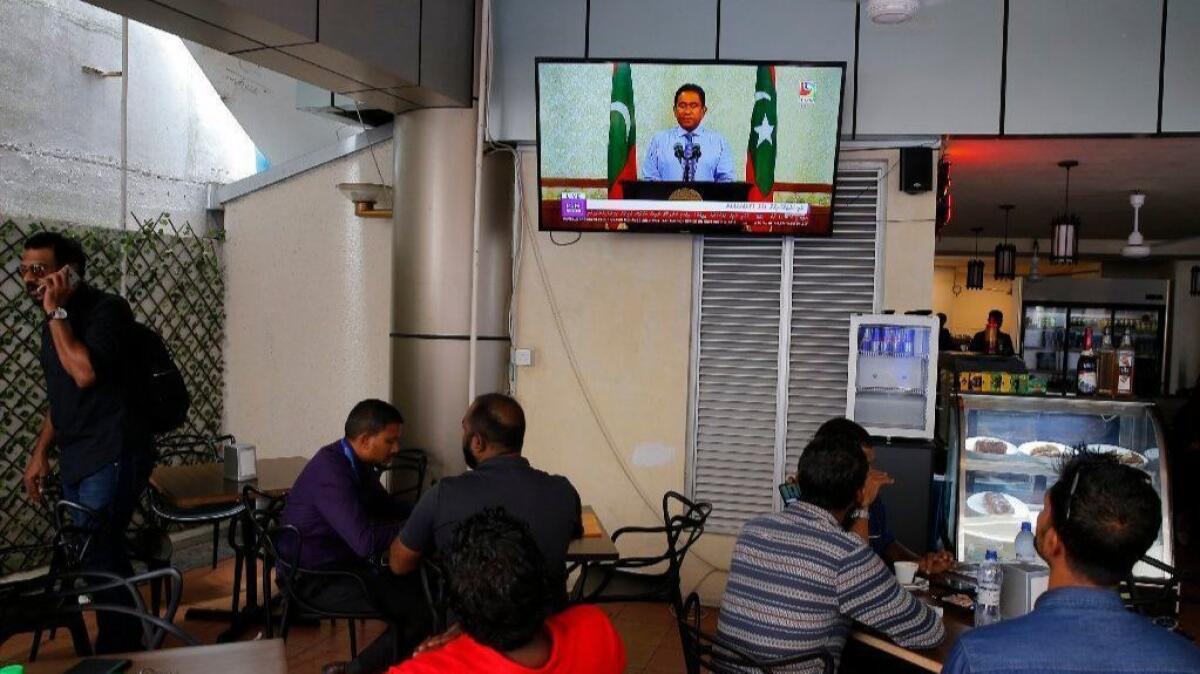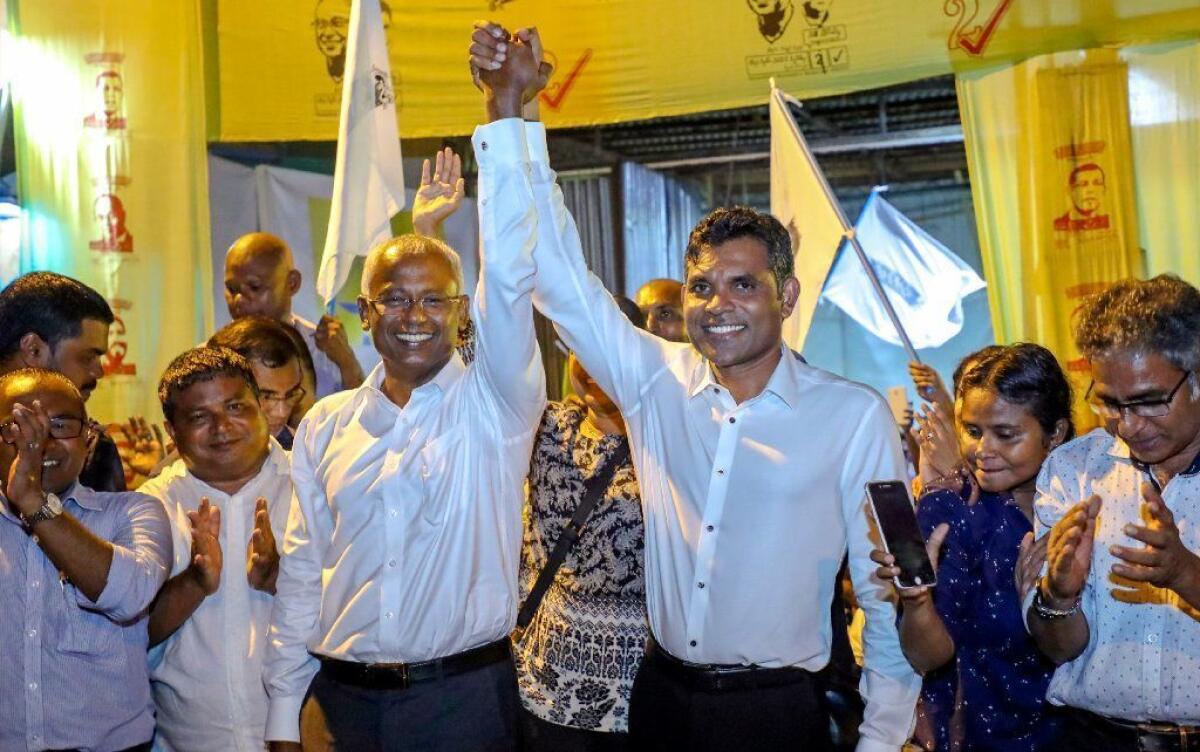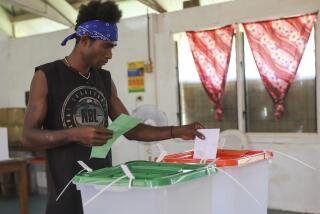He jailed opponents and racked up Chinese debt. Then Maldives’ president quietly conceded election defeat

The authoritarian leader of the Maldives, whose eager embrace of Chinese loans threatened to sink his island nation in debt, conceded defeat Monday after election officials declared a clear win for his opposition rival.
It was the latest in a string of elections in southern Asia in which voters ousted an incumbent who had allowed widespread investment by China, amid growing fears that Beijing’s lending policies were threatening vulnerable economies.
President Abdulla Yameen Abdul Gayoom had kept the coral archipelago south of India — best known for its five-star beach resorts — in a tense limbo. He waited more than 12 hours to appear on television after unofficial returns showed he had lost the fledgling democracy’s third presidential election.
Many Maldivians wondered whether Yameen – who has jailed opponents, dismissed judges and alarmed traditional allies like the United States and India during five tumultuous years in office – would use force to hang onto power.
But on Monday afternoon he pledged to step aside, saying: “The Maldivian people made their decision yesterday. I have accepted that result.”
With echoes of Sri Lanka in 2015 and Malaysia this year, Maldives voters had rejected a government that took on high-interest Chinese loans for showy infrastructure projects, including an $800-million airport renovation and a $400-million bridge.
Opposition leaders said the debt payments would soon eat up most of Maldives’ revenue, although Yameen argued the development was necessary to boost the country’s tourism-dependent economy.
Yameen was defeated by Ibrahim Mohamed Solih, a longtime lawmaker better known as Ibu, who emerged as the consensus opposition candidate after nearly all of Yameen’s other rivals were imprisoned or sent into exile.
With nearly a 90% turnout, Solih won 58% of the quarter-million votes cast, according to preliminary results released by election officials, a resounding win following an election campaign that many feared would be rigged in Yameen’s favor.
Security forces harassed opposition supporters, the government denied visas to foreign journalists and poll monitors, and police raided Solih’s offices on the eve of the vote, claiming to be investigating bribery allegations.
“Not everyone was expecting these results, obviously,” said Dhruva Jaishankar, a foreign policy fellow at the Brookings India think tank in New Delhi. “And questions are still lingering as to why there wasn’t more rigging.”
In claiming victory, Solih pledged to restore democratic institutions and freedom of the press, including investigating the death and disappearance of two prominent independent journalists.
Unlike in Malaysia, where a new government is trying to renegotiate what it calls Beijing’s “unfair” deals, Solih has said he won’t halt any development projects and did not make China a major campaign issue. And shutting out China isn’t an option for most countries, because few other lenders have such deep pockets.
But analysts said the elections in Maldives, Malaysia and Sri Lanka – as well as Myanmar’s 2011 decision to cancel a controversial Chinese-financed dam – demonstrate the political costs to governments seen as being too dependent on one source of investment.
“What you’re seeing is the limitations of China translating economic influence into political influence,” Jaishankar said. “It’s bumping up against walls in all of these places.”

Still, the Maldives result was welcome in New Delhi and in Western capitals, particularly after Yameen withdrew from the Commonwealth of Nations in 2016 over sustained criticism of his government.
Some Western officials worried that the threat of Islamic extremism was rising as the Maldives, a traditionally moderate majority-Muslim nation, accepted more funding from Saudi Arabia to build conservative Islamic schools. Yameen also cut ties with Iran, citing security threats, a move that many saw as a bid to curry favor with the Saudis.
The U.S. Embassy in Colombo, Sri Lanka, congratulated Solih and said it “[looked] forward to a peaceful transition of power.” India’s foreign ministry hailed “the triumph of democratic forces in the Maldives.”
After he takes office, likely in November, Solih would inherit an unwieldy coalition of parties that united against Yameen, including secular and Islamist forces. Mindful of the development needs of Asia’s least populous nation, Solih has pledged to restore relations with countries Yameen spurned – but also to maintain ties with China and Saudi Arabia.
“Under this presidency, it can be hoped that the Maldives’ foreign policy won’t be restricted to China and Saudi Arabia,” said Gulbin Sultana, an analyst at the Institute for Defense Studies and Analyses in New Delhi.
“They’ll probably try to restore relations with the U.S. and India, they will try to get back into the Commonwealth. But I don’t see Chinese investment going away.”
Shashank Bengali is South Asia correspondent for The Times. Follow him on Twitter at @SBengali
More to Read
Start your day right
Sign up for Essential California for news, features and recommendations from the L.A. Times and beyond in your inbox six days a week.
You may occasionally receive promotional content from the Los Angeles Times.







